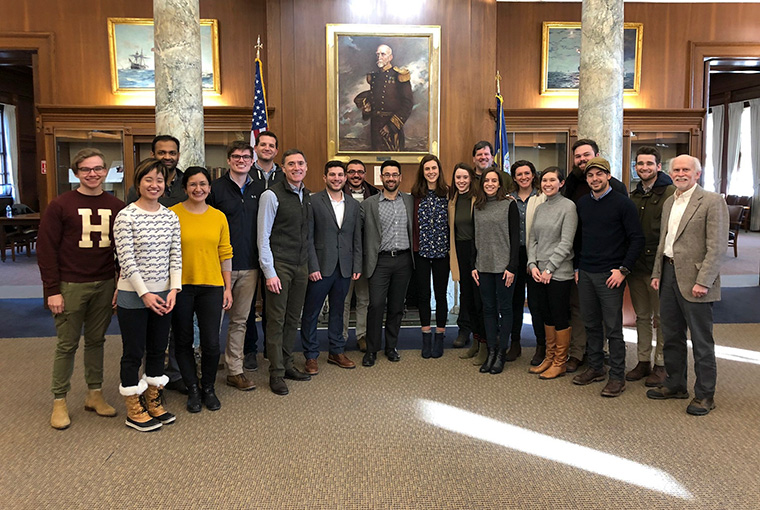U.S. Naval War College and Harvard seek to improve access to surgery around the world

NEWPORT, R.I. – U.S. Naval War College hosted 21 distinguished visitors from Harvard Medical School for a disaster-response simulation on Jan. 31 as part of a burgeoning academic partnership focused on improving humanitarian response and access to essential surgical care during natural disasters and complex emergencies.
“This partnership represents a unique opportunity for both parties to benefit from the experience, perspective and expertise of the other,” said Dr. John Meara, director of the Program in Global Surgery and Social Change (PGSSC) at Harvard Medical School as well as the plastic surgeon-in-chief of the Department of Plastic & Oral Surgery at Boston Children's Hospital.
As both an academic and a medical practitioner, Meara has a unique insight into the surgical needs faced by communities around the globe.
“Nearly 5 billion people worldwide have no access to essential surgical care,” Meara said. “We are very familiar with the role that governments and NGOs (nongovernmental organizations) play in the provision of emergency surgical care. However, I was not as familiar with the role of the military during humanitarian emergencies, and it was a fascinating experience to learn about their approach, their strengths and limitations.”
Dave Polatty, director of the Humanitarian Response Program (HRP) at Naval War College, said the PGSSC staff and Paul Farmer Global Surgery Fellows on Meara’s team are uniquely talented.
“We’re incredibly excited about future collaborations with PGSSC. It is an honor and a privilege to have the opportunity to partner with such an inspiring and knowledgeable group of professionals who are already making so many positive influences through their own specialized work, and yet are still willing to collaborate with others to have an even larger impact,” Polatty said.
“As we face myriad daunting humanitarian crises around the world where surgical interventions and humanitarian health action are essential to helping vulnerable people, I know that partnering with PGSSC is going to help us strengthen humanitarian civil-military coordination from a medical perspective.”
The PGSSC team is currently engaged in projects far from its Boston office designed to strengthen local surgical capacity, improve cost effectiveness and clinical outcomes, and implement innovative technologies in resource-limited settings.
That means Meara’s team has no lack of exposure to challenging environments. They are currently engaged in projects in Brazil, Ethiopia, Guinea, Haiti, India, Pakistan, Peru, Rwanda, Tanzania, Uganda, Zimbabwe, Laos and Cambodia.
The simulation, which was held in Naval War College’s historic Mahan reading room, challenged PGSSC’s seasoned staff and surgery fellows to use military platforms and protocols to coordinate a humanitarian operation in response to a notional hurricane in South America.
During an informal debrief following the half-day simulation, the PGSSC participants shared their observations as well as a wide range of potential areas for shared research.
Multiple participants noted the unique value of experiential learning for immersion in a new field.
“The disaster simulation gave an experience that simply cannot be learned in a lecture setting,” said Rolvix Patterson, a PGSSC research associate from Tufts School of Medicine. “Disasters are inherently confusing and logistically difficult. I was able to experience a fraction of that in this simulation while I managed new problems and potential solutions.”
Kathryn Wall, program coordinator for PGSSC, said this event and partnership with HRP offers a unique opportunity to expand the efforts of global surgery.
“The resources that the military commands and the efficiency with which they can be mobilized is unparalleled by other aid organizations,” she said. “During disaster response, as well as long-term engagements, the military skillset affords unique opportunities for the armed forces to conduct operations in a manner that supports and enhances local surgical systems.”
Taylor Wurdeman, a PGSSC research associate from the University of Miami School of Medicine noted, “This experience is extremely important for those civilian actors who hope to work with the military. Only through understanding the overlap in our goals and missions, can the two groups properly work together.”
As the event came to a close, Meara shared his thoughts with the audience about the tangible value of the collaboration.
“Each field approaches systems development in slightly different ways, but we have similar goals when it comes to aid – quick restoration of baseline health and improved responses in the future,” he said.
“While the global surgery community is best equipped to address issues of surgical access outside of the disaster setting, HRP faculty provide military expertise on what happens during and after a disaster,” Meara said. “When we combine these complementary abilities in strengthening health systems, it has the potential to promote future stability after disaster. That can lead to less disruption, less morbidity and mortality and less financial loss in affected regions.”
HRP and PGSSC staff and fellows plan to conduct collaborative research and publish multiple articles in the coming year on the intersections between military humanitarian assistance and disaster response operations, humanitarian civil-military coordination and increasing global access to essential surgical care.
The Humanitarian Response Program is part of Naval War College’s College of Maritime Operational Warfare. Its goal is to improve the U.S. Navy’s and international militaries’ effectiveness in conducting humanitarian assistance and disaster response operations.
